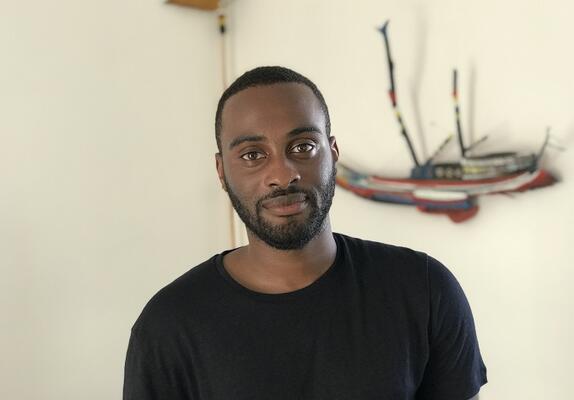
Story: My journey into the fashion industry (en)
Junayd Salimo was born in Maputo, Mozambique, where he graduated in hospitality and tourism. When the time came for him to find a job, he decided to chase his dream of a career in the fashion industry. After a short course in a fashion school in Johannesburg, South Africa, he took part in the Mozambique Fashion Week as a young designer. Following this, he graduated in International Fashion Business from the Polimoda Fashion School in Florence, Italy. He now works for Gucci as a menswear product assistant.
On International Youth Day, we asked Junayd a few questions on his professional experience and his message to young people.
Q: What is your main goal?
A: I would like to give back to my community in Mozambique by sharing my experience with young people who are pursuing a career in the creative industries. In fact, unfortunately, creative industries are not properly supported in my own country and young people are driven mainly towards very traditional jobs. I would like to share my story as a source of inspiration and as a tangible example that professional careers in creative industries are possible and achievable.
Q. What do young people in Mozambique need to become entrepreneurs in the creative industries?
A: I think there are two essential aspects. The first is personal drive. Many young people are trapped by success models focused on very traditional jobs, like medical doctor, lawyer, engineer and so on. The world evolves, models change, and we have to expand accordingly our way of looking at the job market. I grew up in a family of entrepreneurs and always learned how to make the most of everything while trying to accommodate different needs: those of the clients, those of the community and those of the family. So the right personal drive, can be a real change factor in our career.
And then education comes into the picture. If I look at my country, we have an educational system with a solid curriculum but probably very traditional and outdated. I would like to see our schools and universities provide talent scouting services. They should help young people to identify their natural talents and pursue them. They should establish an open conversation with young people in big cities but also in more remote communities. The role education plays in career development is key!
Q: Can international organizations help young people become entrepreneurs?
A: They can definitely make a difference by bringing opportunities and sharing expertise. Mozambicans are very open to learning from others and will be eager to access business models that have proven successful in other countries. International organizations can also support with improving equal access to opportunities. I'm thinking of access to education, which currently lacks transparency, and access to incentives which are somehow mainly confined to young people living in the capital. In Mozambique young people are very talented but need guidance on market needs, on export opportunities and best practices of youth entrepreneurship.
Q: Is there a particular lesson learned you'd like to share with your peers?
A: Believe in yourself and in your dreams. Every dream is achievable despite the country of origin, the colour of the skin, the sexual orientation. You have to love what you're doing in order to successfully engage and connect to others.
Q: What about your dream?
A: I want to gain more experience in the fashion industry for a few more years. Then, in the future, I'd like to start my own business in Mozambique: a ready-to-wear fashion collection. Young, fresh but appealing to all generations. At least 60% will be produced in the African continent, while 40% will come from the rest of the world. Because we should always remember that there are great talents out there, in all business lines, and we can achieve the best possible results by connecting them to form creative business networks.



